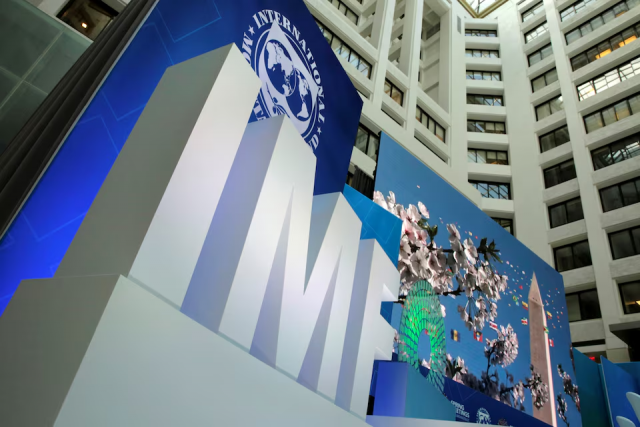Political uncertainty threatens economy: IMF
Notes that new govt has delayed implementation of some reforms

While noting that the government has delayed implementation of some reforms, the International Monetary Fund (IMF) on Friday said high political uncertainty and resurgence of social tensions due to a complex political scene could undermine execution of economic stabilization policies.
The IMF in its last staff level report on the outcomes of the $3 billion Stand-by Arrangement (SBA) appreciated Pakistan’s strong performance in achieving key goals. However, it also highlighted the risks mainly stemming from political tensions and exceptionally high level of external financing requirements.
“Downside risks remain exceptionally high. While the new government has indicated its intention to continue the SBA’s policies, political uncertainty remains significant,” said the IMF.
It further added that “the resurgence in social tensions reflecting the complex political scene and high cost of living could weigh on policy and reform implementation”.
The IMF said while Pakistan did “broadly achieve its narrow objectives, the challenges ahead remained uncomfortably high and would require sustained efforts to effectively address them”.
Pakistan’s fiscal and external vulnerabilities remain very high, including debt sustainability and refinancing risks. The IMF said restoring external viability was critical to ensure Pakistan’s capacity to repay the Fund, and hinges on strong policy implementation
Pakistan was also facing risks related to credit concentration, capacity to repay, reputation and engagement, sociopolitical tensions, and the security situation, it added.
Gross debt-service obligations remain substantial, and current account imbalances stemming from insufficient exchange rate flexibility and import restrictions may require additional policy adjustment to reach external equilibrium, it added.
Delay in Reforms
“Implementation of some reforms started by the caretaker government have been delayed, and renewed efforts are needed to expedite their execution,” said the IMF.
Read IMF urges Rs163b spending cut amid revenue shortfall
The anticipated launch of a scheme to register retailers and enforce filing and collection of their tax obligations, initially scheduled for January 1, 2024, has been postponed.
As of May 8, the FBR had registered 637 retailers –a figure that was mere 75 on April 30.
The IMF said Pakistan’s plans to transform the FBR into a semi-autonomous revenue authority have also been delayed so that an international consulting firm can be engaged for final reforms.
The government has hired Mackenzie consultancy firm for a three-year period in return for over $4.2 million fee –a sum that the Bills and Melinda Gates Foundation will pay, said a senior FBR official.
Debt risks
The report’s language suggested that the debt sustainability remains a concern for the global lender. It said policy slippages, together with lower external financing, could undermine the narrow path to debt sustainability and place pressure on the exchange rate.
The IMF said the risks to debt sustainability remain acute given very large gross financing needs and the persistent challenges in obtaining external financing. It said real interest rates are projected to become an adverse driver of debt dynamics in the coming years.
Despite the IMF programme, the gross reserves remain around $8 billion. The IMF admitted that the SBP’s foreign currency purchases helped offset ongoing debt service payments.
The Express Tribune had reported that the central bank purchased $5 billion to $5.5 billion from the open market as of last month.
The IMF has cut Pakistan’s current account deficit projection to $3 billion for this fiscal year –a figure that is over $3 billion less than its original estimates at the start of the last programme.
The over estimations of the current account deficit always put undue pressure on Pakistan in the shape of arranging more foreign loans. Former finance minister Ishaq Dar—who currently serves as the deputy prime minister— has always remained critical of the IMF’s wrong estimation. Dar used to believe that the IMF put undue pressure on Pakistan by exaggerating the current account deficit projections.
The IMF management should take note of the wrong current account deficit estimations by the IMF staff that have gone off the mark by more than 100%, a government functionary said on the condition of anonymity.
However, the IMF said without import payment restrictions, the current account deficit would have been larger, requiring additional real exchange rate depreciation in order to bring the current account back to equilibrium.
It added that Pakistan should allow the exchange rate to act as a buffer for shocks and refrain from any restrictions on import payments, which could artificially compress the current account.
There is also a need for fiscal tightening to alleviate real exchange rate appreciation pressures, as well as structural reforms to boost productivity and competitiveness, it added.
The IMF has once again flagged the issue of transparency in the working of the Special Investment Facilitation Council (SIFC).
“The SIFC created in August 2023, aimed at attracting and facilitating investment in Pakistan, requires safeguards to bring projects identified through the SIFC under Pakistan’s existing Public Investment Management Assessment framework to ensure accountability and transparency,” it said.
This is particularly important given the SIFC’s power to offer regulatory relief and other immunities and the centrality of a level playing field for all investors, it added.



















COMMENTS
Comments are moderated and generally will be posted if they are on-topic and not abusive.
For more information, please see our Comments FAQ